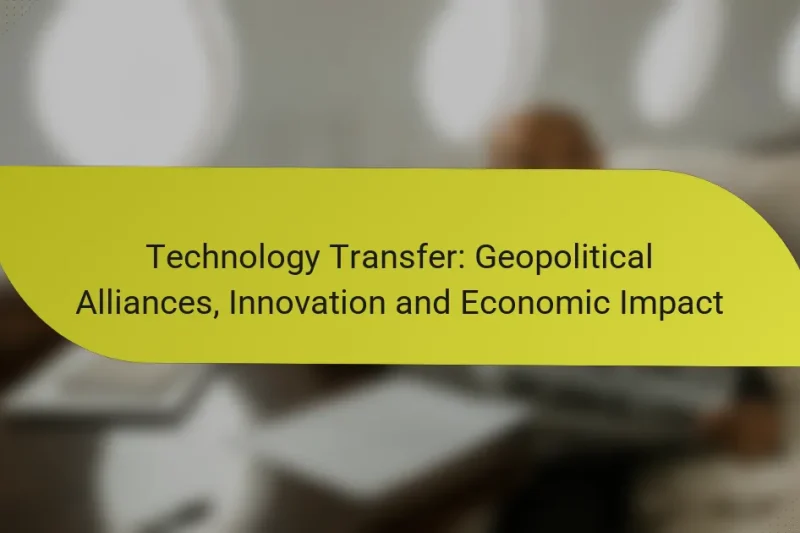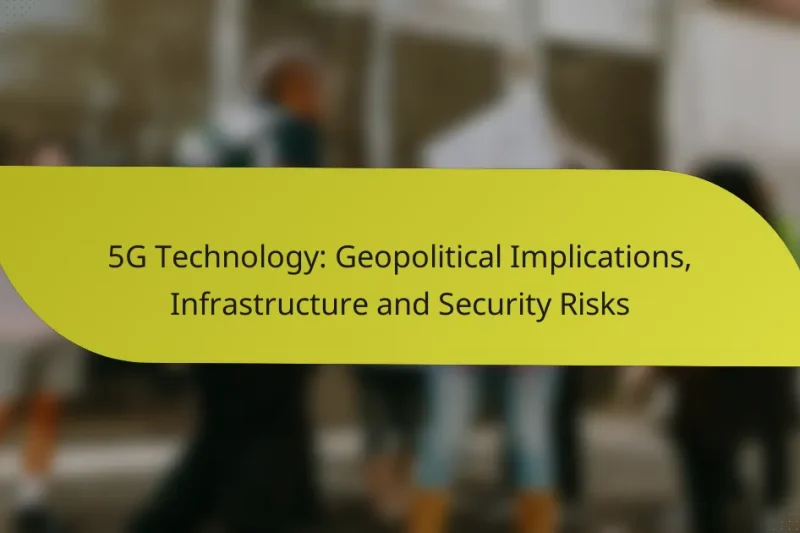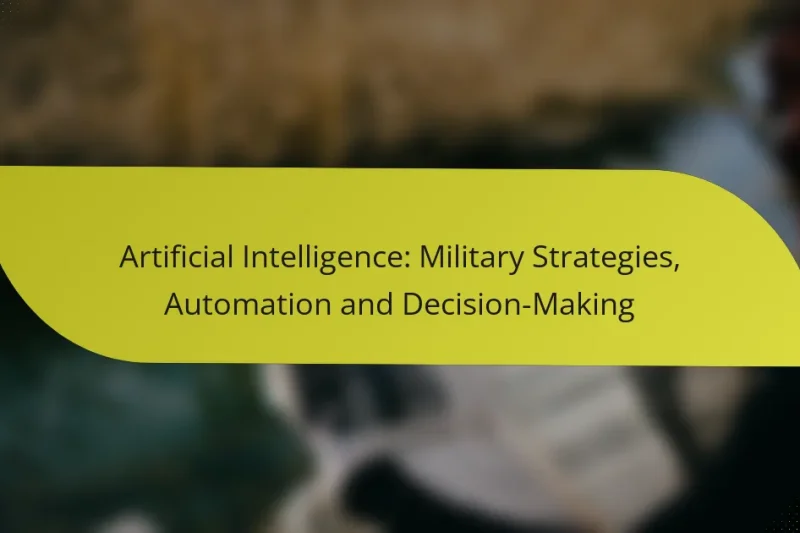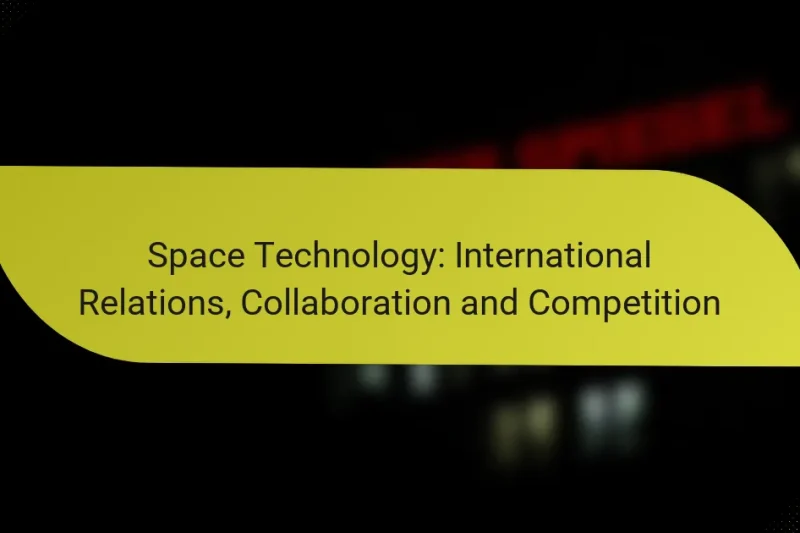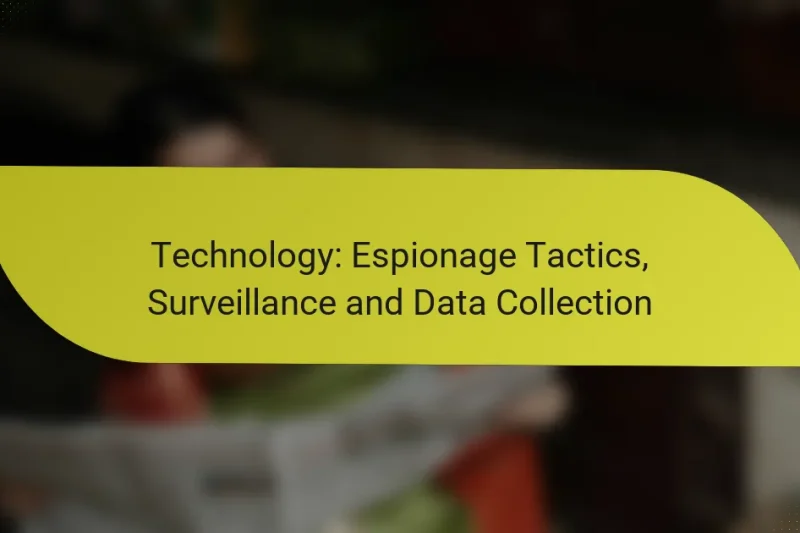Technology transfer plays a crucial role in shaping geopolitical alliances, fostering collaboration among nations, and driving … Technology Transfer: Geopolitical Alliances, Innovation and Economic ImpactRead more
Technological Advancements in Geopolitical Context
Technological advancements are reshaping the geopolitical landscape by enhancing defense capabilities and introducing new vulnerabilities. Innovations such as 5G and artificial intelligence are not only improving communication and decision-making processes but also influencing national security dynamics and power balances among nations. As countries harness these technologies, the implications for global security and international relations become increasingly profound.
5G Technology: Geopolitical Implications, Infrastructure and Security Risks
The advent of 5G technology carries profound geopolitical implications, reshaping global power dynamics and influencing national … 5G Technology: Geopolitical Implications, Infrastructure and Security RisksRead more
Artificial Intelligence: Military Strategies, Automation and Decision-Making
Artificial intelligence (AI) is transforming military strategies by enhancing decision-making and automating combat functions. With improved … Artificial Intelligence: Military Strategies, Automation and Decision-MakingRead more
Space Technology: International Relations, Collaboration and Competition
Space technology plays a pivotal role in shaping international relations, fostering both collaboration and competition among … Space Technology: International Relations, Collaboration and CompetitionRead more
Technology: Espionage Tactics, Surveillance and Data Collection
In the realm of technology, espionage tactics leverage system vulnerabilities and human behavior to extract sensitive … Technology: Espionage Tactics, Surveillance and Data CollectionRead more
Cybersecurity Threats: National Security Policies and Risk Management
In today’s interconnected world, cybersecurity threats pose significant risks to national security, encompassing state-sponsored attacks, ransomware, … Cybersecurity Threats: National Security Policies and Risk ManagementRead more
Digital Currency: Economic Power Dynamics, Regulation and Adoption
Digital currency is transforming economic power dynamics globally, influencing financial transactions and monetary policy in unprecedented … Digital Currency: Economic Power Dynamics, Regulation and AdoptionRead more
How do technological advancements influence global security?
Technological advancements significantly impact global security by enhancing defense capabilities and creating new vulnerabilities. Innovations in technology can lead to improved threat detection, response times, and overall strategic advantages for nations.
Cybersecurity improvements
Cybersecurity advancements are crucial for protecting national infrastructure and sensitive data from cyber threats. Enhanced encryption methods, intrusion detection systems, and real-time monitoring tools are now standard in safeguarding against attacks.
Governments and organizations are increasingly adopting frameworks like the NIST Cybersecurity Framework to guide their security practices. Regular updates and training for personnel are essential to maintain a robust cybersecurity posture.
AI in military applications
Artificial intelligence (AI) is transforming military operations by enabling faster decision-making and improved situational awareness. AI systems can analyze vast amounts of data from various sources, providing actionable insights for commanders.
Examples include autonomous drones for surveillance and AI-driven logistics systems that optimize supply chains. However, ethical considerations and the potential for misuse must be carefully managed as these technologies evolve.
Surveillance technologies
Surveillance technologies, such as facial recognition and drone surveillance, are increasingly utilized for national security purposes. These tools can enhance border security and monitor potential threats in real-time.
While effective, the use of surveillance raises privacy concerns and regulatory challenges. Countries must balance security needs with civil liberties, ensuring that surveillance practices comply with legal standards and public expectations.
What are the implications of 5G technology in geopolitics?
5G technology significantly alters the geopolitical landscape by enhancing communication capabilities and influencing national security dynamics. Its rapid deployment can shift power balances, as countries leverage advanced connectivity for economic growth and military advantage.
Increased connectivity
5G technology enables faster and more reliable internet connections, facilitating real-time communication and data transfer. This increased connectivity can boost economic productivity, allowing countries to innovate and compete more effectively on a global scale.
For instance, industries such as autonomous vehicles and smart cities rely heavily on 5G networks to function optimally. Nations that adopt 5G early may gain a competitive edge in these emerging sectors, potentially reshaping global economic hierarchies.
Impact on espionage
The deployment of 5G networks raises significant concerns regarding espionage and cybersecurity. Enhanced connectivity can provide state and non-state actors with more opportunities to conduct surveillance and cyberattacks, making it crucial for nations to safeguard their digital infrastructure.
Countries must implement robust security measures to protect sensitive data and critical infrastructure from potential breaches. This includes adopting international standards for network security and collaborating with allies to share intelligence on emerging threats.
Global supply chain vulnerabilities
5G technology can expose vulnerabilities in global supply chains, as increased interconnectivity means that disruptions can have far-reaching effects. A cyberattack on a single node in a 5G network could impact multiple industries and countries, highlighting the need for resilience in supply chain management.
To mitigate these risks, businesses and governments should diversify their supply chains and invest in cybersecurity measures. Regular assessments of supply chain dependencies and potential risks can help organizations prepare for and respond to disruptions effectively.
How does artificial intelligence shape international relations?
Artificial intelligence significantly influences international relations by enhancing decision-making processes, enabling new forms of diplomacy, and altering military strategies. Its applications range from predictive analytics in foreign policy to the development of autonomous systems that can change the dynamics of conflict.
AI-driven diplomacy
AI-driven diplomacy utilizes machine learning and data analysis to inform and enhance diplomatic efforts. For instance, AI can analyze vast amounts of data from social media, news articles, and governmental reports to identify emerging trends and sentiments in different countries. This allows diplomats to tailor their strategies more effectively, improving communication and negotiation outcomes.
Countries like the United States and China are investing in AI tools to support their diplomatic missions, which can lead to more proactive engagement in international issues. However, reliance on AI must be balanced with human judgment to avoid misinterpretations of data.
Autonomous weapons systems
Autonomous weapons systems are military technologies that operate without direct human control, often powered by AI. These systems can make real-time decisions on the battlefield, which raises ethical and strategic concerns regarding accountability and the potential for unintended escalation of conflicts. Nations are currently debating regulations to govern the use of such technologies.
Examples include drone strikes and robotic ground vehicles that can engage targets autonomously. The development of these systems is accelerating, with countries like Russia and the U.S. leading in research and deployment. This trend necessitates international dialogue to establish norms and prevent arms races.
Data-driven decision making
Data-driven decision making in international relations involves using AI to analyze complex datasets for strategic insights. Governments can leverage AI to assess risks, forecast economic trends, and evaluate the potential impacts of policy decisions. This approach enhances the ability to respond to global challenges, such as climate change or economic instability.
For example, AI can help predict the outcomes of trade negotiations by simulating various scenarios based on historical data. However, decision-makers must ensure that the data used is accurate and representative to avoid biases that could lead to flawed conclusions. Emphasizing transparency in data sources is crucial for maintaining trust in AI-driven analyses.
What role do emerging technologies play in economic competition?
Emerging technologies significantly influence economic competition by shaping industries, enhancing productivity, and driving innovation. Countries leveraging advancements in areas like artificial intelligence, blockchain, and biotechnology can gain a competitive edge in global markets.
Tech industry dominance
Dominance in the tech industry is often determined by a nation’s ability to innovate and scale emerging technologies. Countries like the United States and China lead in sectors such as AI and telecommunications, which directly impacts their economic power and influence. This dominance can create barriers for other nations trying to compete.
For example, firms in leading countries often attract substantial investments, allowing them to enhance their technological capabilities and market reach. This cycle of innovation and investment reinforces their position at the forefront of the global tech landscape.
Investment in R&D
Investment in research and development (R&D) is crucial for maintaining a competitive edge in emerging technologies. Nations that allocate significant portions of their GDP to R&D, typically in the range of 2-4%, tend to foster environments where innovation thrives. This investment not only supports existing industries but also cultivates new sectors.
Countries like South Korea and Germany exemplify this approach, consistently ranking high in R&D spending. Businesses in these regions benefit from government incentives and a skilled workforce, further enhancing their technological advancements.
Trade policies
Trade policies play a vital role in shaping the competitive landscape for emerging technologies. Nations may implement tariffs or trade agreements that either promote or hinder the exchange of technological goods and services. For instance, the U.S.-China trade tensions have led to restrictions on technology exports, impacting companies on both sides.
Effective trade policies can facilitate collaboration and knowledge transfer, essential for advancing technology. Countries that prioritize open trade relationships often see faster growth in their tech sectors, benefiting from shared innovations and resources.
How are nations adapting to technological disruptions?
Nations are adapting to technological disruptions by implementing strategic reforms, fostering international collaborations, and engaging in public-private partnerships. These approaches help countries navigate the complexities of rapid technological changes while enhancing their competitive edge and security.
Policy reforms
Policy reforms are essential for nations to effectively respond to technological disruptions. Governments are revising regulations to promote innovation, protect data privacy, and ensure cybersecurity. For instance, many countries are adopting frameworks similar to the General Data Protection Regulation (GDPR) to safeguard personal information.
Additionally, nations are focusing on education and workforce development policies to equip citizens with the necessary skills for emerging technologies. This includes investing in STEM education and vocational training programs that align with industry needs.
International collaborations
International collaborations enable countries to share knowledge and resources in addressing technological challenges. By forming alliances, nations can work together on research and development projects, enhancing their technological capabilities. Examples include joint initiatives in artificial intelligence and cybersecurity among member states of the European Union.
These collaborations often lead to the establishment of shared standards and best practices, which can streamline regulatory processes and promote interoperability across borders. Countries are increasingly recognizing the value of collective action in tackling global tech issues.
Public-private partnerships
Public-private partnerships (PPPs) are becoming a vital strategy for nations to leverage private sector expertise and investment in technology. Governments are collaborating with tech companies to develop infrastructure, such as smart cities and advanced transportation systems. These partnerships can accelerate innovation and improve service delivery to citizens.
However, successful PPPs require clear agreements on roles, responsibilities, and funding. Countries should ensure transparency and accountability in these partnerships to avoid potential pitfalls, such as misallocation of resources or conflicts of interest.
What frameworks exist for assessing technological impacts on geopolitics?
Several frameworks are used to evaluate how technology influences geopolitical dynamics. These frameworks help analysts understand the interplay between technological advancements and global power structures, guiding policy decisions and strategic planning.
Technological Determinism
Technological determinism posits that technology is the primary driver of societal change, including geopolitical shifts. This perspective emphasizes how innovations can reshape power relations, alter economic landscapes, and influence national security strategies. For example, advancements in artificial intelligence may shift military capabilities, prompting nations to reassess their defense policies.
While useful, this framework can oversimplify complex interactions by attributing too much influence to technology alone. It is essential to consider cultural, economic, and political factors that also play significant roles in shaping geopolitical outcomes.
Geoeconomic Framework
The geoeconomic framework focuses on the economic dimensions of geopolitical strategies, emphasizing how countries leverage technology for economic advantage. This includes the use of digital infrastructure, trade policies, and investment in emerging technologies to enhance national competitiveness. For instance, countries investing heavily in 5G networks may gain a strategic edge in global communications and data transfer.
Understanding this framework requires analyzing how technology impacts trade relationships and economic dependencies. Nations must navigate the balance between fostering innovation and protecting their economic interests from foreign influence.
Cybersecurity Paradigm
The cybersecurity paradigm addresses the implications of technological advancements on national security and international relations. With increasing reliance on digital infrastructure, nations face threats from cyberattacks that can disrupt critical services and undermine trust. Assessing the geopolitical impact of technology involves evaluating vulnerabilities and the responses to cyber threats.
Countries must adopt robust cybersecurity measures while fostering international cooperation to combat cybercrime. This includes sharing intelligence and establishing norms for responsible state behavior in cyberspace to mitigate risks associated with technological advancements.
